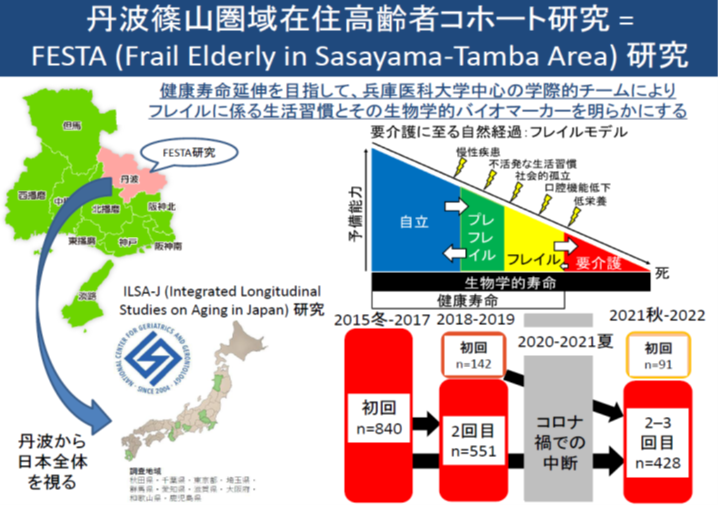Cohort study of elderly people living in the Tamba-Sasayama area: FESTA (Frail Elderly in the Tamba-Sasayama Area) study
Information updated: July 31, 2023
- Seeds Information
- Researcher Information
- What do you expect from collaboration with companies?
- Contact for this research
Seeds Information
keyword
Frailty, sarcopenia, cognitive impairment, osteoporosis, lifestyle habits (diet, physical activity, sleep, social activity), biomarkers, QOL
Field
Gerontology, Geriatrics, Preventive Medicine, Health Promotion
Overview
Since November 2015, we have been hosting a cohort study (Frail Elderly in Sasayama-Tamba Area: FESTA) targeting elderly people living in the Tamba region who are almost independent (not certified for long-term care insurance or requiring long-term care level I or lower). The purpose of this study is to interdisciplinaryly examine factors that contribute to the QOL of elderly people living in rural areas from physical, psychological, social, and environmental aspects. In particular, we aim to clarify the causes of frailty, which is the cause of a decrease in independence and a fall into a state of needing long-term care in old age, and to identify lifestyle and environmental factors that contribute to achieving healthy longevity. We are also searching for biological biomarkers related to frailty and sarcopenia.
Group surveys are conducted six times a year at the Sasayama Medical Center Rehabilitation Center. Survey items include self-description and interview questionnaires (ADL, cognitive function, depression, QOL, nutrition, oral medication surveys, etc.), medical and biological surveys (physical measurements, motor function, blood tests, ultrasound tests, oral function tests), physical activity measurements, and follow-up surveys.
To date, a total of 1,073 people have participated, with 718 research collaborators who have participated more than twice (as of March 2023). In addition to group-based research, plans are in place for 2023 to include mail and phone checks to confirm survival, disease onset, and nursing care certification status.
What's new?
This is a large-scale cohort study that analyzes factors that contribute to the QOL of elderly people living in rural areas from various angles. In addition, the study is expanding the scope of the study in collaboration with other research institutions and local governments.
What are its advantages over other studies?
This cohort study has obtained characteristic data on the subjects described below, making it suitable for research aimed at promoting health and achieving healthy longevity.
- In addition to the test items used in general health checkups, the survey includes interdisciplinary and multifaceted survey items. In addition to medical indicators, including physical function, the survey also contains a large amount of cross-sectional and longitudinal data on psychological and social aspects.
- The subjects are elderly people living in the community who are relatively healthy and independent, and can serve as a control group for data collected at medical institutions.
- We already have longitudinal data from about 400 elderly people at 5-6 year intervals, and we are currently conducting an ongoing study in which we can collect cross-sectional data from more than 300 elderly people per year.
What problem does it help solve?
From the perspective of "extending healthy life expectancy," early diagnosis and prevention of frailty are urgent issues.
In this study, we aim to clarify the causes of frailty and to identify lifestyle and environmental factors that contribute to achieving healthy longevity. Furthermore, we are searching for biological biomarkers related to frailty and sarcopenia, which will hopefully lead to solutions to the above problems.
Possibility of other applications and developments
Starting in 2022, the FESTA study will join ILSA-J (Integrated Longitudinal Studies on Aging in Japan), an integrated study of elderly cohort studies across Japan organized by the National Center for Geriatrics and Gerontology, and is also involved in creating an index to evaluate the degree of aging in Japanese elderly people and developing health promotion measures.
Related Patents
―
Related papers
- Mori T et al. The impact of QOL on the improvement and progression of frailty status in Japanese community-dwelling older adults. Exp Gerontol. 2022 Aug 17;168:111930.
- Marito P et al. The association of dietary intake, oral health, and blood pressure in older adults: a cross-sectional observational study. Nutrients 2022;14(6):1279.
- Kusunoki H et al. Estimation of muscle mass using creatinine/cystatin C ratio in Japanese community-dwelling older people. J Am Med Dir Assoc. 2021; 23: 902.e21-902.e31.
Researcher Information
| full name | Ken Shinmura |
|---|---|
| Affiliation | School of Medicine Department of General Internal Medicine |
| Specialization | Gerontology, Geriatrics, Preventive Medicine, Health Promotion |
| Collaborative Researcher | Yasuyuki Nagasawa, Kensaku Shojima, Hirotatsu Nagai, Ryota Matsuzawa, Kana Hashimoto, Shotaro Tsuji, Masaaki Onishi |
| Related links | Laboratory website |
What do you expect from collaboration with companies?
Collaborating with pharmaceutical and diagnostic drug companies to conduct joint research into early diagnosis, prevention and intervention of frailty.
Contact for this research
兵庫医科大学 大学事務部 研究推進課
E-mail: chizai@hyo-med.ac.jp
Tel: 0798-45-6488

 Research Seeds Collection
Research Seeds Collection
